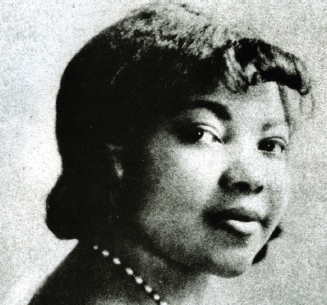Sippie Wallace (1898–1986), “If You Ever Been Down” Blues (1927) (Composed by G. W. Thomas)

Sippie Wallace was one of several legendary women blues singers who dominated the earliest recordings. She is not as renowned as Ma Rainey or the great Bessie Smith, but she poured her heart out with the best of them in response to the eternal themes of the blues:
| STANZA 2 | STANZA 3 |
| I’m a real good woman but my man don’t treat me right | I’m down today but I won’t be down always, |
| I’m a real good woman but my man don’t treat me right. | I’m down today but I won’t be down always. |
| He takes all my money and stays out all night. | ’Cause the sun’s going to shine in my back door some day. |
Wallace accompanies herself on the piano. The recording adds two jazz musicians, but she would have sung just about the same way if she had been performing alone. We’ve chosen this recording because, modest as it may seem, one of the musicians is the outstanding genius of early jazz, trumpeter Louis Armstrong.
After a brief instrumental introduction, Wallace sings two blues stanzas from the piano bench. The instruments play short breaks in between her lines — the trumpet (Armstrong) in stanza 1, the clarinet (the little-

Then Armstrong plays a solo section — an entire twelve-
Wallace, too, joins in quietly during this instrumental chorus; she, too, no doubt, was singing on impulse. She then sings two more stanzas, with instrumental breaks as before.
It’s necessary to listen to this recording in a different spirit from that in which we approach the other recordings of Western music accompanying this book. The scratchy sound on these old discs cannot be helped by digital remastering, and the music itself is not “composed,” of course. It lies somewhere in between true folk music and jazz, a fascinating juxtaposition of the direct, powerful simplicity of Sippie Wallace and the artistry of Armstrong. With a little imagination, one can virtually hear history happening in this recording: Jazz is evolving from the blues.
LISTEN
“If You Ever Been Down” Blues
| 0:10 | Stanza 1 |
| 0:45 | Stanza 2 |
| 1:19 | Trumpet |
| 1:51 | Stanza 3 |
| 2:24 | Stanza 4 |
Sippie Wallace — her name is said to derive from a childhood lisp — was equally known for gospel singing and the blues. African American gospel music — ecstatic choral singing in evangelical church services, with high-